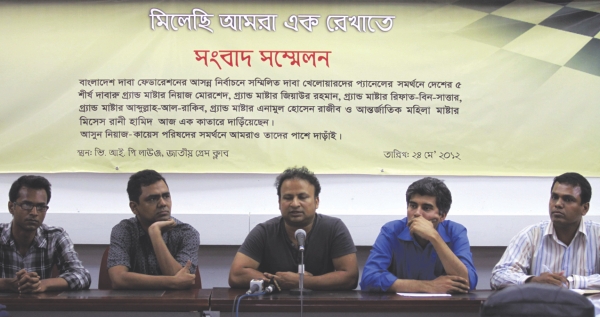| Home - Back Issues - The Team - Contact Us |
 |
| Volume 11 |Issue 27| July 07, 2012 | |
|
|
Sport Of Unsporting Elections Bishwajit Roy In the contemporary world, democratic governance by elected representatives is considered by many to be the most efficient system. In line with this philosophy, after assuming power in 1996, the then Awami League-led government broke the tradition of 'ad-hocism' in the sports arena to set examples at the different federations by holding elections. It was expected that they would maintain the practice after they returned to power seven years later; however, currently, more than half of the national sporting federations and associations in Bangladesh are run by ad-hoc committees, suggesting a possible return to the culture of interim administrations. After being heavily criticised from different quarters, the authority has finally taken an initiative to bring back a sense of accountability to these sporting bodies by arranging elections. The process is ongoing at the moment.
But the recent elections in Bangladesh Football Federation (BFF) and Bangladesh Chess Federation (BCF) have raised many questions. Every genuine sports lover is worried over the influence of district organisers, under the banner of a controversial forum of divisional and district sports associations, in the elections. The forum had allegedly helped manipulate the election of different sports federations in the past and apparently things weren't too different this time either. The councillors, elected with the blessings of the District and Divisional Sports Associations (DSA), are only found active during elections of the federations, where they allegedly trade their votes for money, and soon after the elections, disappear from the scene. The outcome of the May 31 BCF elections came as a real shock to the sports arena since the organisers' panel swept to a landslide victory over the players' panel, by winning all the posts. There is every reason to be worried with the result. The bad influence of the forum not only threatens the future of democracy in sports, but also forces the dedicated and efficient organisers to leave and thus hinder the smooth progress of sports. What's more astounding is that those who have been elected in the chess federation are hardly associated with the game. An alarming sign indeed!
The harsh reality prompted the leading chess players to come under an umbrella in protest of the 'so-called-organisers' who are hardly known in the chess circuit, even though they had earlier proved to be powerless against the DSA-backed panel. The district organisers, with 70 out of 117 councillors, panel was so strong that the vice presidential candidate and the sub-continent's first chess grandmaster Niaz Murshed had to concede defeat against unknown vice-presidential candidates, which was quite a depressing scenario. What gives the forum so much power is the fact that DSAs generally send their loyal representatives to the respective federations, whether or not they are involved with that discipline, who vote for them in the elections. Following the dreaded elections, organisers urged the government to develop a unique constitution, like the one followed by the Bangladesh Cricket Board (BCB), where the posts for district organisers and club organisers are defined. One can't be sure of democracy in the committee if it is elected through polls as the sports-related laws contain several loopholes and many think the government should first modify those. While there maybe be no alternative to elections, an organisation can't run through flawed elections! Only a proper democratic system can decentralise sports in the country and take it to the grassroots. If genuine sports lovers and organisers are compelled to leave due to unfair practices, the respective sports will fail to develop. And here lies the real problem with democracy in sports. The councillor plays a very important role. It is not only unfortunate but also alarming for the whole process when someone becames a councillor without any experience or contribution in the field. What gives the DSAs so much freedom is the lenient nature of the constitutions of sports federations. It allows them to retain their councillorship by merely participating in two national meets, in four years. They however don't give any importance towards organising their district competitions. There have been instances where players living in Dhaka collected consent letters from the respective DSAs to take part in the national championships of a game of their own accord to ensure the DSA's councillorship in chess federation; even though those DSAs do not hold any local competitions or take any initiatives to send players to the national championships. The National Sports Council (NSC), the regulatory body of the country's sports, also allegedly doesn't always play a neutral role during the polls and reportedly favours the incumbent committee by picking NSC representatives in line with recommendations from the incumbent committee. Taking the experience of the recent polls into consideration, the authorities concerned should find a way to make elections worthwhile. A proper system must be developed to ensure the participation of all stakeholders of the respective disciplines.
|
||||
|

